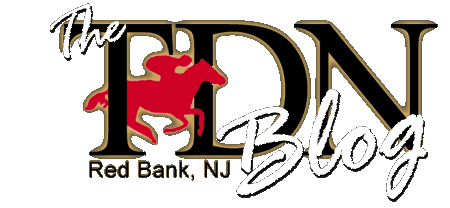 |
| Thewifedoesntknow heads to the track before a race in May 2012. Photo © Mike Carroll |
Part 5 in a weekly series of training blogs about Thewifedoesntknow, a Thoroughbred mare made famous by a viral Monmouth Park YouTube video and who is now in training to be a show hunter with New Jersey-based trainer Carole Davison.
Recently, I've met a few hunter/jumper Thoroughbreds who were trained by Timothy Shaw when they were at the track. Each of these horses are sound, athletic, and full of personality. I contacted Tim about his former trainee, Thewifedoesntknow; he was kind enough to share his thoughts about her, as well as provide some insight about the transition from racetrack to show ring.
TDN: How did you get started training Thoroughbreds and how
long have you been training?
Shaw: I was always been drawn to animals. As a child in Ireland, I would
spend every moment I had at a friend's family farm. I couldn't get enough of it.
That changed when we moved back here. I went to college and had a
"normal" job. I went to the races one day... I bet a horse... she won... and I met the trainer (Dan Perlsweig),
who invited me to the barn the next morning and BOOM. Next thing you know, I'm
back in a barn and couldn't get enough of it again. I've been training for 12
years now. Life just has some strange twists.
 |
| Trainer Tim Shaw and dearly-departed canine companion, Flynn |
TDN: What kind of personality did Thewifedoesntknow have when
she was in training with you?
Shaw: She always had
a classy way of handling herself. She never got upset about much and was very
professional and easy to work with. She knew her job every day and was eager to
do it. Her favorite hobby was eating and she pursued it with vigor. I was
just happy to have a filly that loved to eat.
TDN: If a horse has potential to be a show horse, is it
something you can see when the horse is still in training at the track?
Shaw: I'm learning more and more about what makes a good show horse. My girlfriend Alicia Morgan has a show barn and
she taught me about what she looks for. It basically comes down to being a
natural athlete. When I deal with a horse on the track that has beautiful
movement, and good head carriage, and engages the hind end without us teaching
them to do it... that's a good sign. Usually Alicia just punches me and says
"That one when it's done." She really wanted to work with The Wife
but we have gotten involved with a couple of broodmares and a few retirees
already. We wouldn't have had the proper time to devote to her and she deserved
it.
TDN: For our readers who are unfamiliar with racing, can you
give us an example of a typical schedule for a horse who is in your barn?
Shaw: The track opens at 5:30am, so our first horses hit the track
very early. At about 4am, the stalls are cleaned and water buckets and feed
tubs scrubbed. We have a couple of round pens and try and get a few out for 30
minutes or so. We are a bit restricted at the track as far as facilities. We
don't have traditional paddocks. We try and get the horses who have raced the
previous day, or had a hard workout, in the round pens to kick up their heels a
bit. Every horse gets bathed after turnout or training, then walked about 30
minutes, followed by about 15 minutes of hand grazing. Then it's back to the
stall for an alfalfa snack followed by a good grooming, liniment, and at about
10:30, morning grain. Generally, if it's not a race day, the barn is peaceful and
quiet by 11am.
TDN: With all the recent news articles, Thoroughbreds are
getting more attention both in the media and in the show ring. What can owners
and trainers do at the track and upon retirement to ensure that their horses
make a successful transition into their second career as pleasure/show horses?
Shaw: Be careful about where your horse goes. Finding a home for a
horse is very easy. Finding a proper home is not. This horse, no matter at what
level it competed, ran its heart out for you. Check references and be sure that
the people are qualified and knowledgeable about horses. In addition, as in the
case of The Wife, if the horse's form deteriorates for no apparent reason, it's
trying to tell you something. Don't "drain the lemon". Give the horse
a chance at another career.
TDN: Once a horse is retired from racing and is in a new home,
do you have any advice for helping the horse get acclimated to the new
lifestyle?
Shaw: Treat it with respect, but don't fear it because it's a
"hot" Thoroughbred. Remember where it has come from. It's trained for
speed, is fed a high-energy diet, and for the most part, has limited turnout.
On the other hand, the track is full of noises. For example, what track do you
know of that has a train that runs right through the stable area? We have that
at Monmouth. This is in addition to the cars, trucks, trailers, loudspeakers
and every conceivable noise you can imagine. If a horse can get used to that,
your barn with the scary vertical is a piece of cake. Use common sense and
listen to the horse. It will tell you.


No comments:
Post a Comment